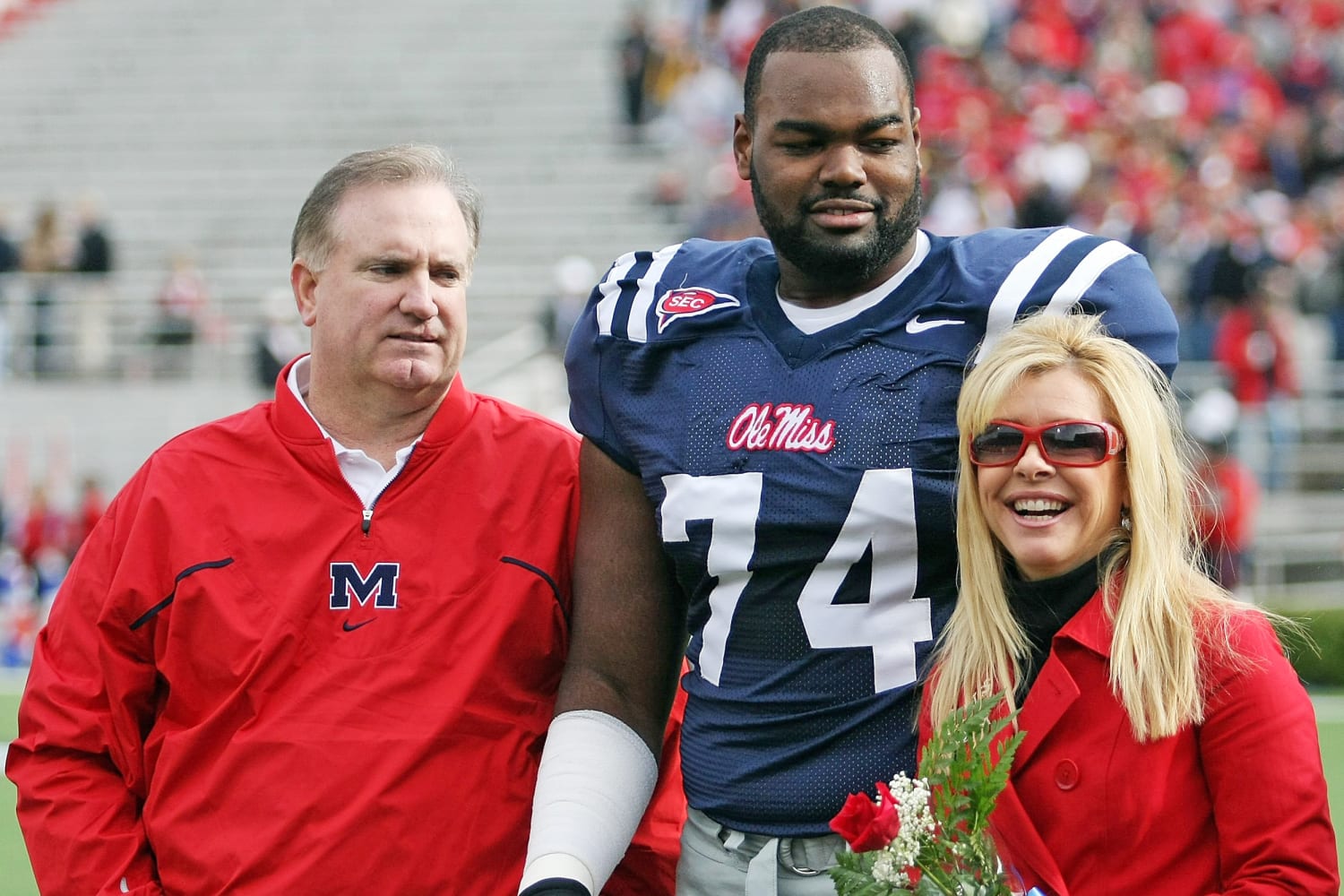[ad_1]

Sean and Leigh Anne Tuohy hit back at former NFL star Michael Oher in a new court filing Thursday, saying they never intended to adopt him and denied enriching themselves off his name.
The Tuohy’s took in Oher, now 39, when he was in high school. He went on to stardom playing for Ole Miss and then the NFL, a story documented in the Oscar-winning movie “The Blind Side.”
The rosy image of a happy, adoptive Tennessee family depicted in the film was shattered when Oher alleged in an Aug. 14 court filing that he didn’t know he had never actually been adopted. Instead, he claimed he had been placed in a conservatorship and the Tuohy’s had profited from his name and cut him out of “The Blind Side” profits.
In the August filing, Oher requested a Shelby County probate court judge end the conservatorship that started in 2004 when he was 18.
In a response filing Thursday, the Tuohys, both 63, said that while they thought of Oher as a son, they “admit that they never intended to, and in fact never did, take any action to assume legal custody through the Juvenile Court of Shelby County.”
The Tuohys maintained they are “ready, willing, and able to terminate the conservatorship by consent at any time,” the filing said.
They “vehemently” denied Oher’s claim that they saw him as a “gullible young man whose athletic talent could be exploited for their own benefit.”
Oher claimed in his filing that he only learned in February that he had been placed in a conservatorship and hadn’t actually been adopted — which the Tuohy’s called “demonstratively false.”
They cited his 2011 memoir “I Beat The Odds,” where Oher indicates he was aware the Tuohy’s were appointed as conservators.
The Tuohys refuted his claim that they told him they intended to legally adopt him. But they said they considered Oher part of their family, and over time he referred to them as “mom” and “dad,” and they referred to him as “son.”
“Clearly, the Respondents (The Tuohy’s) loved the Petitioner and as a result provided him with shelter, food, and clothing and in fact bought him more than one vehicle for his personal use,” the filing said. “In fact, they have always felt that the Petitioner was like a son and have used that on occasion but not in a legal sense.”
The Tuohys said they entered a conservatorship to allow Oher to play college football at the University of Mississippi, the Tuohys’ alma mater and where they were boosters.
“When it became clear that the Petitioner could not consider going to the University of Mississippi (“Ole Miss”) as a result of living with the Respondents, the NCAA made it clear that the only way he could attend the Ole Miss if he was part of the Tuohy family in some fashion. Conservatorship was the tool chosen to accomplish this goal,” the filing said.
Oher enrolled at the University of Mississippi in Aug. 2005 on a football scholarship at the age of 19.
The Tuohys denied having “ultimate control of his contracts” and said they never signed any contract for him when it came to his career. The only documents they “may or may not have been required to sign” were Ole Miss scholarship papers, the filing claimed.
Oher had claimed that the Tuohys raked in massive profits from “The Blind Side” film, but they say the profits were split equally.
Oher claimed in his petition that the Tuohys had contract negotiations with 20th Century Fox (now 20th Century Studios) regarding the creation of The Blind Side movie, based on the book “The Blind Side: Evolution of a Game” by Michael Lewis. The Tuohy’s denied that claim, saying they “signed but never negotiated any contact” with the movie studio.
Oher claimed that the Tuohy’s negotiated for themselves and their natural born children a contract price of $225,000 plus 2.5% of all future “defined net proceeds.” The Tuohy’s denied this, saying they received a portion of the money paid to Michael Lewis, “which was something less than $225,000.”
Michael Lewis, the author of “The Blind Side” book, told The Washington Post last month that no one made a windfall from the film. “Everybody should be mad at the Hollywood studio system,“ Lewis said.
The Tuohys said that Oher’s share of the profits was paid to them. They then “paid the taxes due on these funds for some period of time but still cut a check for a full share (20%) to Petitioner.”
Oher claimed that due to the success of the movie, a donation was maid to Leigh Ann Tuohy’s foundation for $200,000 in 2010 in Sean Tuohy’s name. Oher claimed that the Tuohys and movie studio did not ensure his benefit from the movie’s success.
The Tuohy’s admitted that they received a $200,000 donation to their foundation, but said that Oher had the opportunity to receive that exact same sum to be placed in a foundation or charity of his choice. But he “failed to take the necessary action to initiate the foundation despite the recommendations of the Respondents” and an attorney, the Tuohys said.
The filing ended with the Tuohys requesting the court deny all the relief Oher seeks in his petition.
A spokesperson for the Tuohys had no additional comment Thursday.
Don Barrett, attorney for Michael Oher, said Thursday: “The Tuohys have filed a response within the deadline required by Mike’s petition. We look forward to Mike finally getting his day in court, where we are confident that the truth will prevail.”
[ad_2]
Source link
